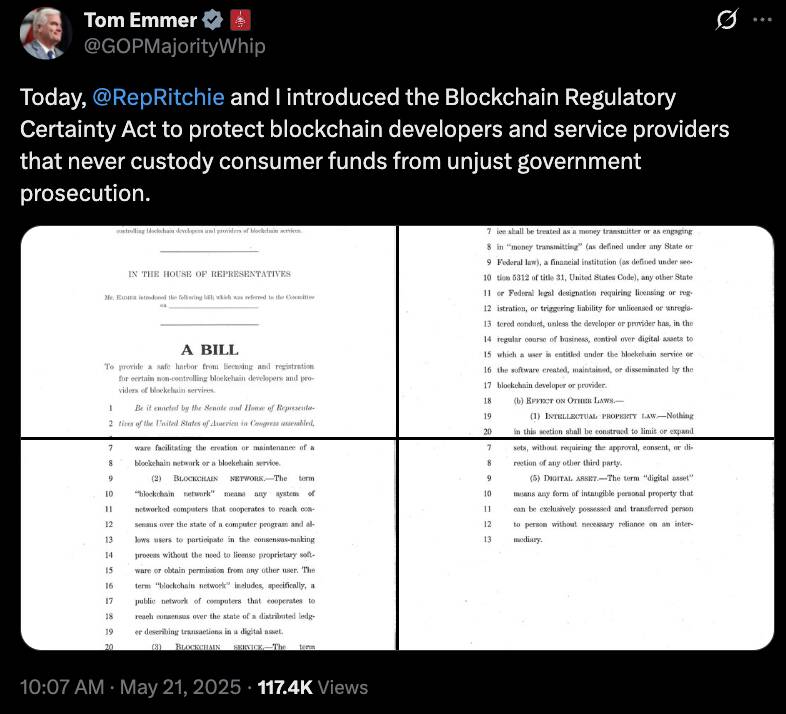In an intriguing development within the cryptocurrency landscape, bipartisan support is emerging for a new blockchain bill in the U.S. Congress. On May 21, Minnesota Representative Tom Emmer announced the reintroduction of the Blockchain Regulatory Certainty Act, aiming to clarify that digital asset developers and service providers not holding consumer funds should not be classified as money transmitters. What distinguishes this effort is the co-sponsorship by Democratic Representative Ritchie Torres, marking a rare collaborative approach in an often divided Congress.
Representative Torres emphasized the importance of this legislative effort, stating, “The Blockchain Regulatory Certainty Act reflects a thoughtful, bipartisan effort to get digital asset policy right.” This sentiment comes following the rejection of similar proposals in the previous session, showcasing lawmakers’ responsiveness to feedback in crafting a more effective regulatory framework that balances innovation with necessary oversight.
“While similar language was voted down in markup last Congress, we took that feedback seriously and returned with a smarter, sharper framework that protects innovation without compromising oversight.” – Ritchie Torres
Despite this progress, uncertainty looms over the bill’s chances of passage in the House of Representatives, as the political climate remains tense. Multiple Democratic lawmakers, including Representative Maxine Waters, have expressed concerns about advancing crypto-related legislation amidst investigations into President Donald Trump’s potential conflicts of interest tied to the industry. These concerns include financial ties to entities involved with cryptocurrency, raising ethical questions that are detaining legislative action related to blockchain.
Support for the proposed bill has garnered backing from various advocacy organizations, such as the Crypto Council for Innovation and the Blockchain Association, reflecting a broad coalition interested in fostering a positive environment for digital asset growth. As the legislative process unfolds, the ongoing debate over crypto regulation, coupled with high-profile events like Trump’s upcoming dinner with memecoin stakeholders, further complicates the narrative, making it a critical moment for the future of cryptocurrency legislation in the United States.
Support for Bipartisan Blockchain Legislation
The recent developments in the U.S. Congress regarding blockchain legislation indicate a shift towards bipartisan support despite ongoing controversies. Here are the key points related to this topic:
- Bipartisan Support: Representative Tom Emmer, a Republican, along with Democratic Representative Ritchie Torres, is co-leading the Blockchain Regulatory Certainty Act, signaling a cooperative effort across party lines.
- Regulatory Clarity: The Act aims to define that digital asset developers and service providers without custody of consumer funds are not classified as money transmitters, which could facilitate innovation in the blockchain space.
- Industry Support: Advocacy groups such as the Crypto Council for Innovation and others are backing the bill, suggesting that it could create a more favorable environment for cryptocurrency development.
- Resistance from Some Lawmakers: Other Democratic members, like Maxine Waters, are indicating intentions to block crypto-related legislation unless issues concerning former President Trump’s conflicts of interest are addressed.
- Cascading Impact: The outcome of the bill’s journey through Congress, influenced by the current political dynamics, could significantly shape the regulatory landscape for blockchain and cryptocurrency in the U.S.
“The Blockchain Regulatory Certainty Act reflects a thoughtful, bipartisan effort to get digital asset policy right.” – Ritchie Torres
Understanding these developments is crucial for readers, especially those involved in the cryptocurrency and blockchain sectors, as the evolving legislative environment could impact their operations, investments, and the future of digital assets in the U.S.
Bipartisan Support for Blockchain Regulation Amidst Crypto Controversies
The recent announcement from Representative Tom Emmer regarding the reintroduction of the Blockchain Regulatory Certainty Act is creating ripples in both the political and financial landscapes. As the push for clearer digital asset regulations gains momentum, this bipartisan initiative is emerging in stark contrast to the current skepticism among many left-leaning lawmakers, driven primarily by concerns surrounding potential conflicts of interest involving former President Donald Trump. The collaboration between Emmer and Democratic Representative Ritchie Torres presents a unique angle in the often-partisan debates on blockchain and cryptocurrency regulation.
Competitive Advantages: One of the most significant strengths of this bipartisan approach is its potential to unify legislators across the aisle. Unlike previous attempts that faced resistance from both parties, the involvement of Torres, who holds a reputation for supporting crypto-friendly policies, can be a game-changer. Moreover, with endorsements from various advocacy organizations like the Crypto Council for Innovation and the Blockchain Association, this bill appears to be well-supported by industry stakeholders. The clarity it aims to provide—specifically that digital asset developers without custody over consumer funds are not classified as money transmitters—can greatly enhance legal certainty and foster innovation in the space.
Disadvantages and Challenges: However, this initiative is not without its challenges. While the support from Torres might attract attention, other prominent Democrats, including Representative Maxine Waters, are poised to block any crypto legislation unless their concerns about Trump’s ties to the industry are addressed. This internal division within the Democratic party could hinder the bill’s passage, creating an uphill battle in garnering the necessary votes in the House. Additionally, the accusation that this legislation turns a blind eye to ethical concerns could alienate certain voter demographics who prioritize transparency and accountability over rapid industry growth.
Potential Beneficiaries and Issues: Should the Blockchain Regulatory Certainty Act pass, it could provide critical advantages for digital asset developers and service providers seeking regulatory clarity. Startups and established companies alike would benefit from a more predictable regulatory framework, potentially spurring investment and fostering innovation. However, on the flip side, this legislative effort might exacerbate tensions within the Democratic party, as those aligning with constituents wary of Trump’s financial dealings might feel sidelined. Therefore, while the bill could pave the way for progress within the cryptocurrency sector, it could simultaneously deepen political divides, complicating future legislative efforts in this arena.















